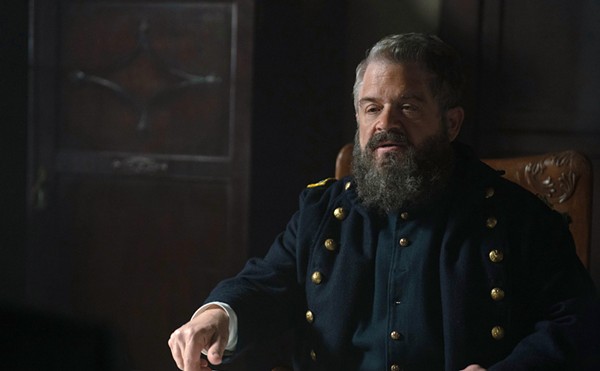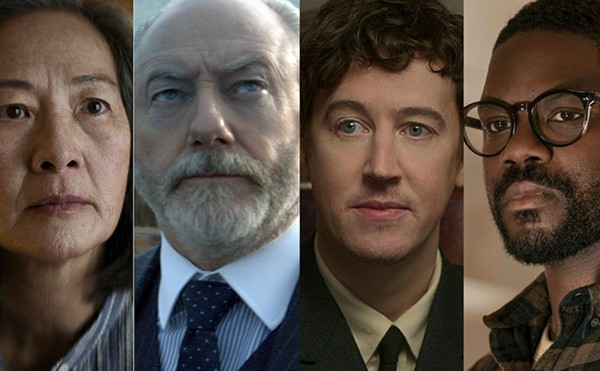Henry Kissinger, the Machiavellian secretary of state under Richard Nixon, is no Mother Teresa. But, according to Christopher Hitchens, who in a 1996 book raked muck over the career of the revered missionary born Agnes Boxha Bojaxhiu, neither was Mother Teresa. In The Trials of Henry Kissinger, Hitchens accuses the man who won the Nobel Prize for Peace of complicity in war crimes. He should, contends Hitchens, be brought to justice for murder, kidnapping, and torture.
In a film called The Trials of Henry Kissinger that screens Thursday, September 5 at Trinity University's Stieren Theater, directors Eugene Jarecki and Alex Gibney survey the statesman's illustrious career but, following Hitchens, offer arraignment instead of hagiography. Kissinger is the cabinet official most adept at transforming himself into a wealthy, influential celebrity. "Power is the great aphrodisiac," he declared, and he pursued and exerted power lustily, if not ethically. The film charges Kissinger, an unrepentant champion of realpolitik, with international war crimes. It advances claims that he helped scuttle Vietnam peace talks in 1968 and engineered the secret, unauthorized bombing of Cambodia in 1969. The Trials of Henry Kissinger holds him responsible for the 1970 assassination of a Chilean general opposed to Augusto Pinochet and for a massacre in East Timor in 1975.
Judges in several countries have tried to summon Kissinger to account for atrocities committed while in office, and concern for his fate is one reason the Bush administration has refused to recognize jurisdiction by the new International Criminal Court. The trials of Henry Kissinger may never occur, but The Trials of Henry Kissinger is a provocative way to examine his culpability and, more generally, the proper place within foreign policy of concern for human rights.
It is a fitting way to conclude what its organizer, Robert Huesca, a professor of communications at Trinity, hopes is San Antonio's first annual Human Rights Watch Traveling Film Festival. With the support of student organizations and academic units, Huesca has brought three provocative offerings to town this week. The two others, War Photographer and Gaza Strip, screened last Tuesday and Wednesday, respectively.
For two weeks every June since 1994, Human Rights Watch has commandeered the Walter Reade Theater at New York's Lincoln Center for a film festival. A few of the offerings, including Before Night Falls and Bread and Roses, have since found commercial distribution and audiences in San Antonio. Others, such as La Ciudad, Scout's Honor, and School Prayer: A Community at War, were later broadcast by PBS. All of these are extraordinary, as both documents of injustice and cinematic craft. So I often wondered about the dozens of festival films we never get a chance to see. One of the 2002 entries, War Photographer, was even a finalist for an Oscar. This year, San Antonio audiences have at last been able to view an abbreviated version of the Human Rights Watch Film Festival — three of the 14 films shown in New York. A fourth, Afghanistan Year 1380, a disturbing record of life and death in that devastated country post-9/11, will air September 9 on the PBS series P.O.V.
War Photographer is an uncommon portrait of an uncommon man, James Nachtwey. Director Christian Frei follows Nachtwey to Kosovo, Indonesia, South Africa, the West Bank, and other troubled spots in order to take the measure of a photographer who has spent 20 years documenting atrocity and misery.
It takes courage and stamina to throw oneself repeatedly in harm's way, but what is most striking about Nachtwey is his reticent serenity. He has been wounded several times, contracted rare diseases, and made painful personal sacrifices to pursue his work. Much of Frei's film proceeds in silence, broken only by the clicks of Nachtwey's camera and the wailing of victims whose private anguish he invades. The war photographer is both a benefactor and a vampire, and the director of the War Photographer, like his subject, risks his life and his humanity to uncover horrors.
Gaza Strip is a Palestinian child's-eye view of daily life during the current Intifadah. Director James Longley organizes footage around the perceptions of 13-year-old Mohammed Hejazi, a newsboy in Gaza City. He spends much of his time hurling stones at Israeli soldiers and raging at the inevitable retaliation. Gaza Strip offers wrenching images of human suffering. Its strength is its immediacy. But that is also its weakness — its failure to provide the perspective necessary to comprehend this suffering and begin to end it.
The Trials of Henry Kissinger
7:30pm Thursday,
September 5
Free
Jane & Arthur Stieren Theater
715 Stadium Drive
999-8515














